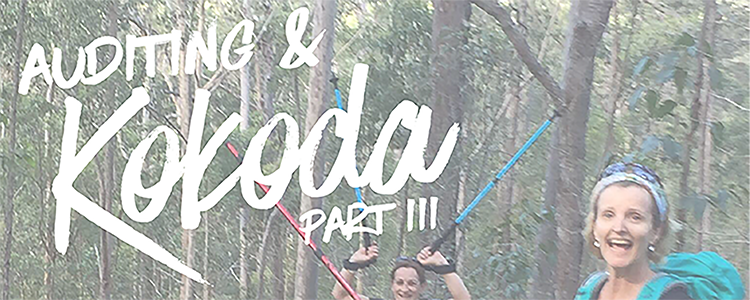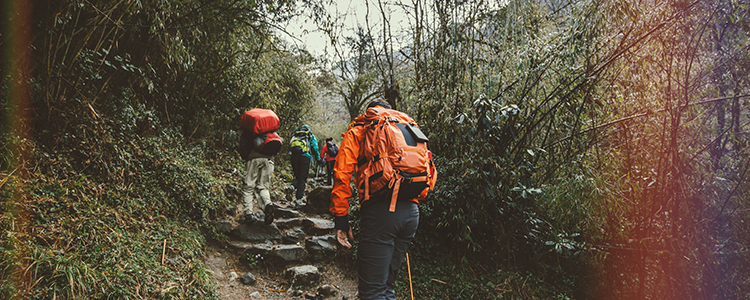
How auditing is preparing me for the Kokoda Trail Part #3
How auditing is preparing me for the Kokoda Trail - Part #3
So, preparation is really peaking at the moment. All the things that make this real are happening! Things like Doctors’ visits, health checks, vaccinations, prescriptions, insurance and visas.
As this article goes live it is only days till will leave.
I have had my Doctors Health Check which included things like:
- Any recent operations (specifically knee or joint operations)
- Asthma, diabetes, epilepsy, high blood pressure, cholesterol, heart disease, depression, phobias or allergies
- General health checks for BMI, blood pressure, blood sugar level, pulse rate
- A long list of vaccination and medicine requirements
- And last but not least my GP had to sign me of on being ‘fit’ enough to complete the Trail
I instantly thought of clause 4.5.1.2 Health Surveillance which is in AS/NZS 4801:2001. Now I know I said I was going to refer to the draft ISO 45001 for these articles, however it’s difficult to see a direct correlation of this clause to the draft standard. I did a search on the words ‘health surveillance’ and found that it does get a mention in ISO 45001 Annex A under A.9.1 Performance Evaluation where it states that an example of what could be monitored and measured can include, but are not limited to 1) health surveillance of workers. It also appears in A.8.1.2 Eliminating hazards and reducing OH&S risks under d) administrative controls where it states introduction of a health or medical surveillance programme for workers who have been identified as at risk.
Now remember That Annex A is the Guidance for use section of the Standard and it is not what we audit or raise nonconformances against. It certainly does help us to understand the requirements when we are developing and improving our OH&S management system though.
Something else that stood out to me and actually made me chuckle at the time, was the Doctors Letter provided by the Kokoda Tour Group explaining the conditions on the Kokoda Trek. I’m guessing this is to ensure my GP had a full understanding of what I was getting myself into and maybe giving me a full understanding as well!
The Kokoda Trail is 96km long and we cover the distance in 9 days. The track is located in a mountainous and remote part of PNG. The track climbs to an altitude of 2190m and over the complete track we climb more than 6000m and descend over 6000m in height. This part of PNG is hot, humid and wet with rough mountain tracks, narrow passes and numerous river and log crossings.
Conditions on the track are challenging, strenuous and physically demanding. High physical stress, dehydration and body overheating are major concerns for your patient.
A large part of the area that we trek in is inaccessible by helicopter or any other emergency service. There is no access to emergency first aid or medical facility on the Kokoda Track.
Wow! So that really makes you want to do it even more doesn’t it! So, this might be why I have to sign an Assumption of Risk form, do you think? This is the form where I state that I accept all the inherent risks of the proposed adventure trip and accept the possibility of personal injury, death, property damage or loss.
Now, I had to have a think about this one and discuss with a well-respected work colleague as to where this might align with ISO 45001.
I certainly welcome your thoughts on this as well so please feel free to comment.
So, I’ve gone up the path of communication with this one. ISO 45001 Clause 7.4 Communication, 7.4.1 General where it states that when establishing its communication process(es), the organisation shall take into account its legal requirements and to ensure that OH&S information to be communicated is consistent with information generated within the OH&S management system, and is reliable. This essentially means that the information is to be factual and able to be verified. Clause 7.4.3 External communication further supports this by stating that the organization shall externally communicate information relevant to the OH&S management system, as established by the organization’s communication process(es) and as required by its legal requirements and other requirements.
As always with OH&S the standout requirements are consultation, awareness and communication.

And finally, I have had to take out Travel Insurance which MUST include coverage for medical evacuation. I’m going to introduce a different Standard with this one as I instantly thought of insurance as ‘sharing the risk’ which is a risk treatment mentioned in ISO 31000:2009. Clause 5.5 Risk treatment under 5.5.1 General states that risk treatment options are not necessarily mutually exclusive or appropriate in all circumstances. The options can include the following:
- Avoiding the risk by deciding not to start or continue with the activity that gives rise to the risk
- Taking or increasing the risk in order to pursue an opportunity
- Removing the risk source
- Changing the likelihood
- Changing the consequence
- Sharing the risk with another party or parties (including contracts and risk financing) and
- Retaining the risk by informed decision
Now, I know I picked "f) Sharing the risk with another party or parties" which aligns nicely to the Travel insurance requirements I’ve had to take out, however as I was typing these risk treatments up I suddenly thought that all of these could be considered to a degree.
Let’s have a look at these risk treatments again from the perspective of deciding to do the Kokoda Trek –
- Avoiding the risk by deciding not to start or continue with the activity that gives rise to the risk
- I could decide not to do the Kokoda Trek at all and therefore avoid the risk completely
- Taking or increasing the risk in order to pursue an opportunity
- Going ahead with the Trek to gain the experience or pursue this opportunity
- Removing the risk source
- The risk source may be difficult to remove in this instance. The risk source is the element which alone or in combination has the intrinsic potential to give rise to risk.
- Changing the likelihood
- Changing the consequence
- By implementing controls which have been discussed in previous Kokoda articles there is the potential that the likelihood has changed. Would the consequence have changed though; that is the question? This is always a hot topic for discussion in classroom training.
- Sharing the risk with another party or parties (including contracts and risk financing) and
- As discussed, this could be the Travel Insurance
- Retaining the risk by informed decision
- Yes, I’m definitely going ahead (retaining the risk) by informed decision. I know what I’m up against. I know it will be tough. I know it will be challenging. I know it won’t be easy.
...But I’m still going to do it!





